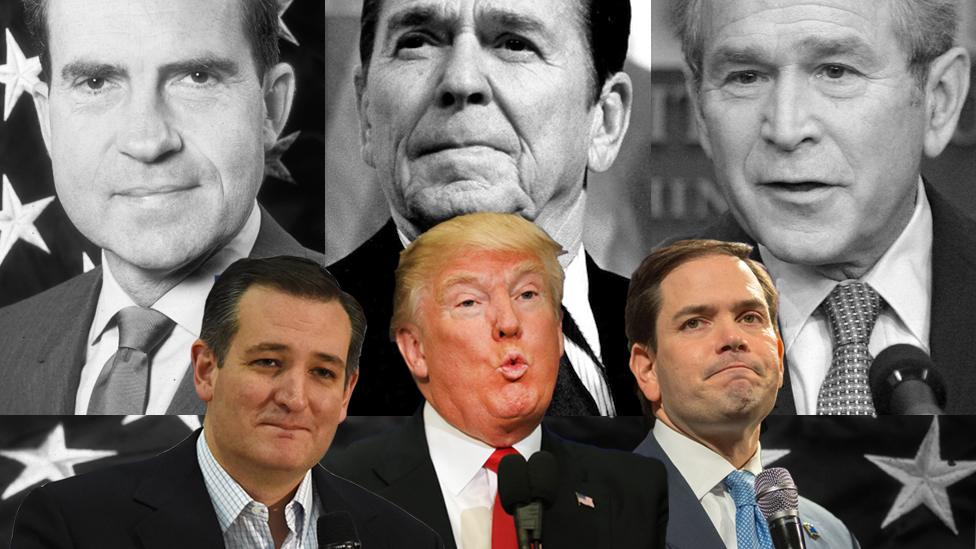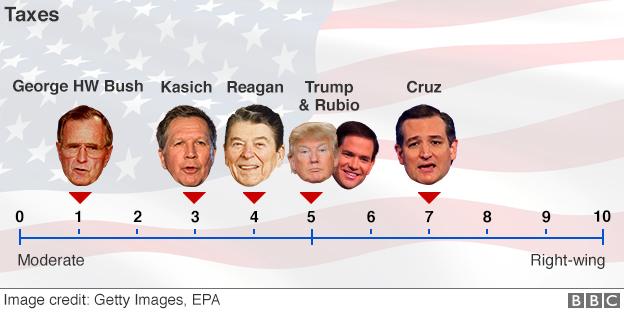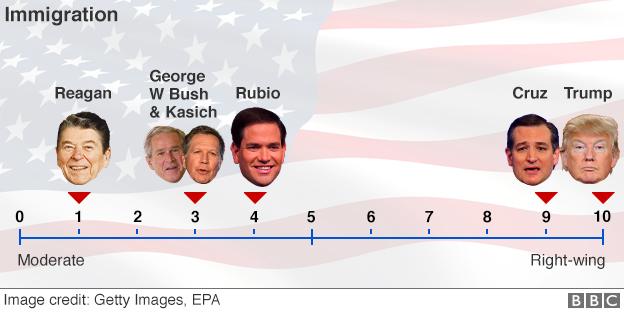US election 2016: How Donald Trump compares to Ronald Reagan
- Published
- comments

Donald Trump has been condemned by many on the left and some on the right as being beyond the pale, a toxic virus that exists on the fringes of the political mainstream. But where do his policy views actually fit when compared to his fellow presidential candidates - and past Republican commanders-in-chief?
The New Yorker has definitely set a new mark when it comes to acceptable policy prescriptions on the topic of immigration, but in other areas he is moderate and occasionally to the left of his contemporaries.
Here's a look at where Mr Trump falls on the political spectrum - along with his top competitors and past Republican presidents. It reveals a Donald Trump who isn't quite so extreme after all - and a party that has moved decidedly to the right in recent decades.
Taxes
Taxes are going down, down, down

Tax-cutting has been a much-loved tune in the Republican hymnal for decades, and this year's crop of candidates are humming along. John Kasich, Donald Trump and Marco Rubio all promise various combinations of capital gains tax cuts, income bracket simplification and lower marginal rates. Mr Rubio's proposal also includes a significant boost to the tax credit given to those with children.
Ted Cruz's plan is the outlier in the group. He's the only Republican candidate left who is pitching a major change to the existing tax structure, including a 10% flat tax for individuals and a 16% tax on corporations that replaces the existing corporate income and payroll taxes.
Ronald Reagan, the godfather of Republican tax-cut plans, passed sweeping income bracket reductions in his first term but worked with Congress to roll back some of his measures when government budget deficits boomed. His successor, George HW Bush, had to go back on his "no new taxes" campaign pledge to further address the growing national debt - a move that many conservatives viewed as an unforgivable betrayal.

National security
To spend or not to spend?

Now that Rand Paul is out of the race, the Republican field is generally in favour of expanding defence spending, although several of the candidates have staked out more budget-conscious positions.
Like Mr Paul, Ted Cruz voted against a defence spending bill that he viewed as too expensive. He also backed curtailing National Security Agency surveillance powers. As a congressional leader in the 1990s, John Kasich made a name for himself as a budget hawk - even on military issues.
Meanwhile, Donald Trump touts increased spending on national defence as a key part of his "make America great again" programme and generally supports broad government surveillance powers. Marco Rubio does as well, and stakes out the far-right position, promising to boost military spending by $1tn (£710bn) over 10 years.
Mr Rubio's position harkens back to the days of Ronald Reagan, with his massive Cold War-era increases, external in military programmes. George HW Bush is at the other end of the conservative spectrum, as he oversaw significant military cuts after the collapse of the Soviet Union.

Immigration
Trump redefines Republican policy

Donald Trump likes to boast that he put the topic of immigration on the map in the Republican campaign. While that may be a bit of an exaggeration, he has certainly owned the issue, with his condemnation of undocumented Mexican migrants and calls to build a wall on the US-Mexican border and temporarily prevent all Muslims from entering the US.
The New York billionaire has pulled the entire Republican field to the right, but Ted Cruz has come the closest to matching Trump's rhetoric, echoing his call to deport all undocumented aliens currently living in the US.
Marco Rubio was once the face of Republican immigration reform efforts, including providing a pathway to permanent residence for undocumented workers. He's since backed away from legislation he sponsored and says the US must address border security first. John Kasich also talks up border security but says citizenship has to be part of the conversation when an immigration reform deal is reached.
The farther back in time one moves, the more pro-immigration the Republican Party appears. George W Bush was an enthusiastic supporter of ill-fated congressional efforts at bipartisan reform in 2007. Back in 1986 Congress passed - and President Ronald Reagan signed - an immigration reform bill that granted amnesty to undocumented aliens who entered the US prior to 1982. Such a move would be politically radioactive in today's Republican Party.

Foreign policy
Tough talk - but differences over US involvement

Foreign policy once dominated the debate among the Republican candidates, but it has taken a back seat to Donald Trump's economic message of late.
The billionaire front-runner's views are largely nationalistic, but they tend toward restraint. He's had kind words for Russia's Vladimir Putin and seems content to allow him to lead the way in Syria. John Kasich has also taken a more moderate position, cautioning that the global state of affairs is not as dire as it seems. The two part ways on President Barack Obama's Iran agreement, however, with Trump calling for renegotiating it, while Kasich is more circumspect.
Ted Cruz assumes a much more aggressive posture on Iran, saying he'd "tear up" the deal on the first day of his presidency. Although he promises to wage a "carpet bombing" campaign against the so-called Islamic State, he has expressed reluctance to get too involved in the Syrian civil war. Marco Rubio has no such qualms and has called for more US intervention in the region, along with greater confrontation with Russia and renewed sanctions on Cuba.
Ronald Reagan would fit neatly in the middle of this pack. Although he backed US military support in Cold War battles, he shied away from direct US military action in all but the most limited instances. George W Bush, by contrast, engaged US forces in major conflicts in Afghanistan and Iraq after the 9/11 attacks and pledged to use US power to support global democracy.

Abortion
(Almost) no love for Planned Parenthood

Last July the women's health provider Planned Parenthood became the target of conservative condemnation after an activist group released tapes of organisation officials talking bluntly about paying for foetus tissue donations. Most candidates lined up against the organisation, with Ted Cruz promising that as president he would launch an investigation into what he said was likely criminal activity. The Texan also promises to push for a total ban on abortions, without an exception for pregnancies caused by incest or rape.
Marco Rubio has been more vague about whether he supports such exceptions, but has been nearly as aggressive in terms of his attitude toward Planned Parenthood. John Kasich, on the other hand, is in favour of permitting abortions in such cases, or when doctors determine that the life of the mother is at risk.
In what can only be considered a significant break with Republican orthodoxy, Donald Trump has repeatedly defended Planned Parenthood, saying that the organisation performs important medical services (although he agrees with his competitors that they shouldn't get US government funding). He says he's now anti-abortion, although he backed legalisation for many years.
Trump points to Ronald Reagan as an example of another Republican that had a late conversion to the anti-abortion cause. Reagan condemned the procedure as president, and moved to cut off government funding to abortion providers both in the US and abroad, but he was criticised by some on the right as not being aggressive enough in his actions.
And then there's Richard Nixon, who was president when the Supreme Court decision legalising abortion across the US, Roe vs Wade, was handed down. He largely kept silent on the subsequent controversy, but recently released tapes recorded the day after the court announcement show the president saying that abortion was sometimes "necessary" - such as in the case of mixed-race children. There may not be a place on the scale for that particular view.

Who are Trump's voters?
Donald Trump has broadened his appeal